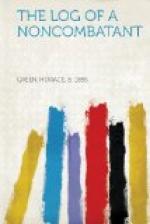For our purpose the best approach to Brussels was by way of Ghent. Luther pushed on ahead while I was finishing a story. The following morning, shouldering my knapsack, which now contained an extra supply of army rations, and carefully stuffing my different sets of credentials in different pockets (one for Belgian, one for German, and one for English consumption), I crossed the River Scheldt and made a slow and tortuous railway journey to Ghent.
Ghent lies thirty miles west of Antwerp. The trip took seven hours. During the course of it I passed north of the Belgian lines and through the western sector of forts, that is to say, Fort St. Nicholas, Fort Haesdonck, and Fort Tete de Flandre. It was the same road along which Winston Churchill’s English marines and the remnant of the Belgian forces retreated after the fall of Antwerp.
Ghent resounded with praises of its American Vice-Consul, Julius Van Hee, a hair-trigger politician and a live wire if there ever was one. Van Hee, with his intimate knowledge of four languages and the Yankee knack of being on the right spot at the right time, twice saved blood-shed in the streets of Ghent and in one instance probably prevented a repetition of the scenes at Louvain.
In Ghent I again found Luther, with a fine young rumor in his pocket —a rumor which turned out to be correct—that six German spies were to be executed next morning at sunrise. The place mentioned was behind the museum in a public park.
“I suppose we’ll take it in,” said Luther.
“I don’t know about that,” I answered; adding that, although executions might be part of the day’s work for a war correspondent, I drew the line at seeing my first murder before breakfast. The tip was correct enough except that it mentioned the wrong park.
The following noon the Military Governor, according to regulations, caused to be posted circulars announcing that the men had been put to death; but at all events I am glad to say that at that early date I did not have the experience of watching six blindfolded wretches backed up against a wall, of seeing the officer drop his arm as a signal, and of hearing the fatal crack of a dozen muskets, as the bodies collapsed like a telescope, crumpled inward with the chin upon the chest, and fell forward to the earth.
Chapter II
The Second Bombardment Of Termonde
September 15th was our day with Henry Verhagen, the tall gray alderman of the town that was once Termonde.
During all the time I was with him Verhagen did not speak a bitter word. On the contrary, he was calm—particularly calm as he stood beside the mound where the Belgian soldiers were buried in the center of the ruined town, pointed to the pile of bricks where he had lived, and told us how in two nights he had lost 340,000 francs, his son, his factory, and his home. It was from him, from the burgomaster’s wife, and from a priest that we learned the story of the city that had ceased to be.




